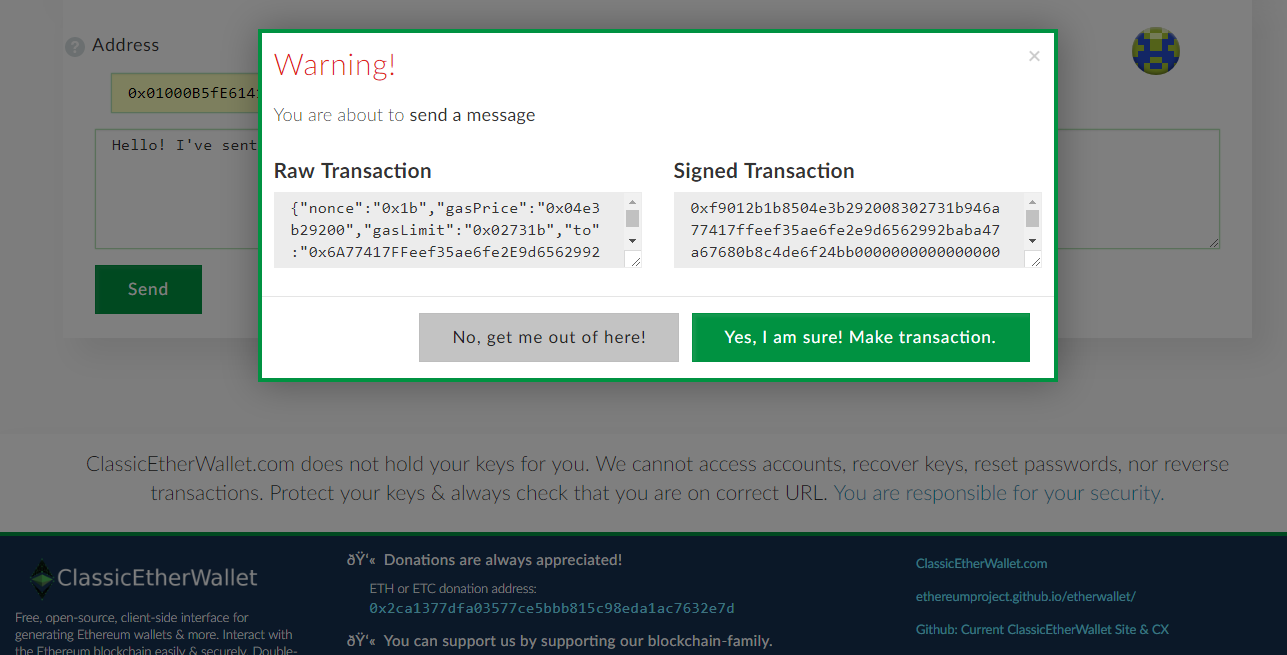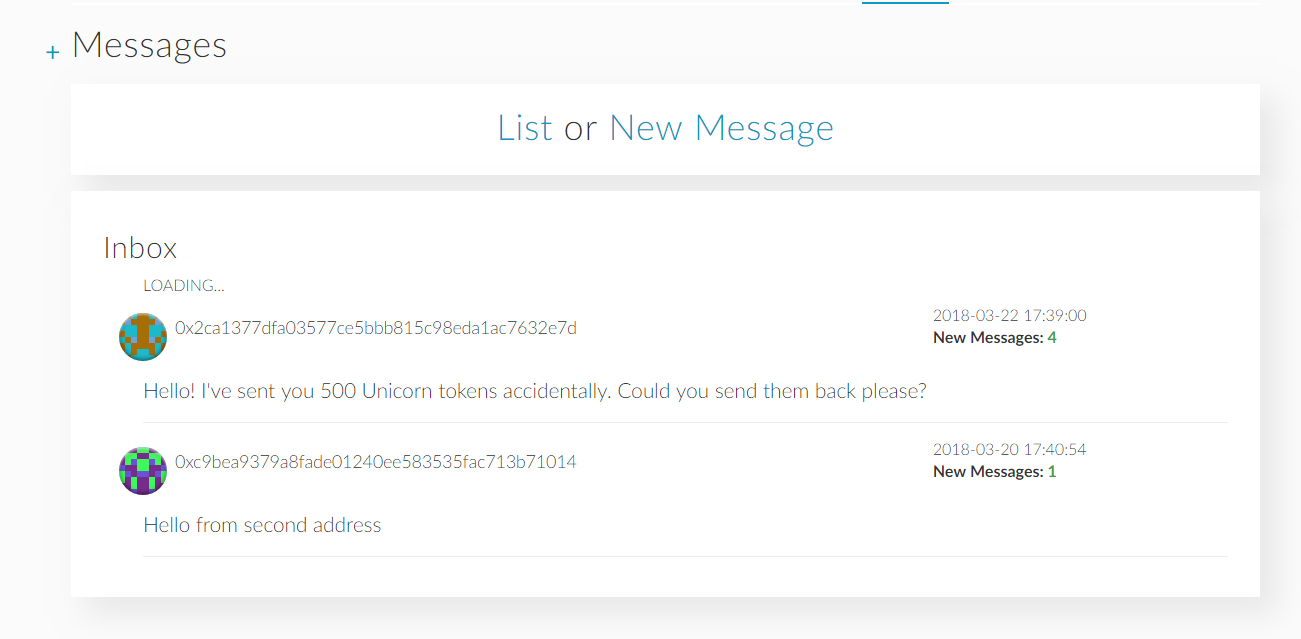-
Notifications
You must be signed in to change notification settings - Fork 5.3k
New issue
Have a question about this project? Sign up for a free GitHub account to open an issue and contact its maintainers and the community.
By clicking “Sign up for GitHub”, you agree to our terms of service and privacy statement. We’ll occasionally send you account related emails.
Already on GitHub? Sign in to your account
ERC: address-to-address messaging system protocol #802
Comments
|
Looks very useful. Just the other day I was thinking about something similar, given how many issues I've seen of people mistakenly sending tokens, or even the case you mention of a contract being hacked and having no way to communicate with the perp. Have you thought about firing an Event when a message is sent? It would make it easier to read all messages for a particular contract and even filter them by date or sender. |
|
@pabloruiz55 Thanks for the useful idea. I'll update the code with |
|
We could possibly enhance this a little. If someone sends a transaction it exposes their public key. A blockchain explorer could act as an oracle in this case. |
|
That's would be a very expansive way of sending messages. |
|
@3esmit the expense doesn't really matter here; use public key cryptography to organize conversation off-chain. This serves the (particularly useful) purpose of a central location to check for messages that you want to send to an address, without having to know anything about someone besides their address. @Dexaran I would also include that this is also useful for contacting owners of ENS domains. I like this and could contribute time towards building a canonical interface for this contract. |
|
@RorschachRev it is an interesting idea to use Ethereum's private and public keys of an address to encrypt/decrypt messages, but it's not related to the logic of the smart-contract in any case. Encryption/decryption process should be off-chain. |
|
@Dexaran Of course, I mean this is a good usecase for entering negotiations with squatters (for example, we've been trying to obtain truebit.eth for ages, including with ascii transactions, but without progress). |
|
There is one concern that I'd like to discuss: crosschain interoperability. Request for comment: cross chain interoperabilityThe whole Ethereum ecosystem lacks an address to address central messaging system. It is not a local problem of Ethereum, it is a bit more global. Currently, there are some "Ethereum-compatible" chains: ETC, PIRL, UBQ, EXP, MusiCoin (and probably RootStock) and they all need to solve the same problem. NOTE: I've said Ethereum-compatible chains since they all utilize the same address schemes. The owner of To be honest, I don't see any reason to deploy exactly the same service on each chain separately. This is not to benefit of anyone. I think that the best idea is to deploy the service on one chain and then consider it a core part of the overall messaging system. A UI that have access to multiple nodes (for example MyEtherWallet) can connect to the core-node (node of the network that will be used to deploy this service contract) and look for messages. If the message for the address is found at the core-network, then the UI should display it to the user. It doesn't matter if the user is currently on the core-network or any of the alternative Ethereum-compatible chains. This approach has some advantages:
I'd like to receive more feedback and any thoughts about this. |
|
Message system in use: ethereumproject/ECIPs#85 (comment) General infoHere is a reference implementation of the described Message System at CLassicEtherWallet. https://ethereumproject.github.io/etherwallet/#messages Interchain Address-To-Address messaging contract is currently deployed on Ethereum CLassic chain at 0x6A77417FFeef35ae6fe2E9d6562992bABA47a676 address. It is an open-source contract and it is licensed under GPLv3. Source codes could be found here: https://github.com/EthereumCommonwealth/Address-to-Address-messaging FunctionalityThe described messaging system allows:
HowtoSending a message.
Watching your messages.
NOTE: This is an emergency message system! Not an on-chain chatroom.Every symbol that you broadcast to the network will cost you gas. This is not an on-chain chat! This is only an emergency system that allows you to contact an owner of a certain address if there is no way to contact him off-chain. For example if you accidentally sent a number of funds into someone elses address or if you want to interview TheDAO hacker. |
|
Ideally wallets like Metamask and MEW would display received messages within their interfaces. |
|
There has been no activity on this issue for two months. It will be closed in a week if no further activity occurs. If you would like to move this EIP forward, please respond to any outstanding feedback or add a comment indicating that you have addressed all required feedback and are ready for a review. |
|
This issue was closed due to inactivity. If you are still pursuing it, feel free to reopen it and respond to any feedback or request a review in a comment. |






Abstract
The following describes the details of the smart-contract based messaging system which aims to allow Ethereum users to directly contact the address owner without having to know who hi (she) is.
Motivation
Ethereum lacks a central messaging system that will allow to contact an address owner directly. You can send him a transaction with ASCII message attached as
databut it is likely that address owner will not even try to recognize it as a text message. As the result there is no viable way to deliver a message to address owner directly.This service is necessary in some circumstances, for example:
You sent someone a token, the existence of which this person does not know. It is likely that a person will spot an incoming ETH transaction, but there is no way that a person will spot an incoming token transaction or the fact that his balance of this token increases. You need to contact the owner of this address and ask to send your tokens back.
You sent ETC into someone's ETH address. The same situation as with tokens. It is likely that a person will not recognize an incoming transaction of an alternative currency. But he definitely can access it and send it back (or just go and sell it).
You spotted that someone have deployed a contract that is proven to be vulnerable. If you're a good guy then you want to contact an owner of the "vulnerable contract" and warn him that he is going to use a contract that contains vulnerability and his funds are at risk in this case.
You spotted that someone has hacked something. You would like to contact a hacker and kindly ask him to send everything back but the hacker likely will not respond if you will try to contact him via forums. I suppose that it is the most important case. On-chain methods of communication are the only way to securely contact a hacker or to respond if you are the hacker.
Specification
Basic address-to-address messaging smart-contract.
This is a simple smart-contract that stores messages mapped to addresses by id and a mapping that represents the last message id for each address. Last message id increases for the receiver address when this address receives a new message (there is no message at
last_message_idin fact... this represents a numeric id that will be filled with the next incoming message in fact). If thelast_message_idis equal to 0 then there are no messages for this address. Iflast_message_idis equal to 2 then there are 2 messages at positions 0 and 1 for this address.There is no possibility to edit, change, delete messages. This contract is not a messenger or a chat. This contract is an emergency way to contact an owner of a certain address when there is no possibility to contact him off-chain. As the result, editing and deleting messages has no reason because it will still be available via history of transactions.
Basically, there is no way to encrypt message on-chain because there is no way to hide an input call data. As a result, there is an additional field for attaching a public asymmetric encryption key. If the owner of a certain address has a desire to allow someone to contact him privately, then he can publish his public key at this contract and describe what type of key he has published at the "Key type" variable (for example
PGP public keyorRSA 2048 bit public key). Anyone else is allowed to look at the public key in the contract, encrypt the message outside the network and send an encrypted message on this contract.Methods
sendMessage
Delivers a string message to
_toaddress owner.lastIndex
Returns an index of the last message for the
_owneraddress.NOTE: This means that there are messages at
0tolastIndex - 1positions. There is no message atlastIndexposition actually. This will be filled with the next message for this address. If thelastIndexis equal to0then there is no messages for this address.getLastMessage
Returns the last message for the
_whoaddress and the sender of this message.NOTE: Message is actually at
lastIndex(_who) - 1position.getMessageByIndex
Returns the message for
_whoaddress at_indexposition and the sender of this message.getPublicKey
Returns a public key of the
_whoaddress and a type of this key.setPublicKey
Sets a public key and a description of key type for the sender address.
Events
NewMessage
Triggered when a new message is sent. This event logs
timestampof the message in UNIX seconds.PublicKeyUpdated
Triggered when a customer updates a public key of an address or sets it first time. This event logs a new public key and key type to make it easier to recognize which encryption algorithm should be used with this key.
Resolution
Obviously, this contract can not guarantee that an owner of the address will receive a message. It requires to be supported by UIs. It is likely that an owner of a certain address will see a message if MyEtherWallet, MetaMask or Mist will display messages somehow (for example a certain number of last messages).
Also, it makes sense to standardize possible public key types. Ideally, UI should have a button "Send message to address" and "Send encrypted message to address" and distinguish public key, key type and then encrypt message automatically.
The text was updated successfully, but these errors were encountered: